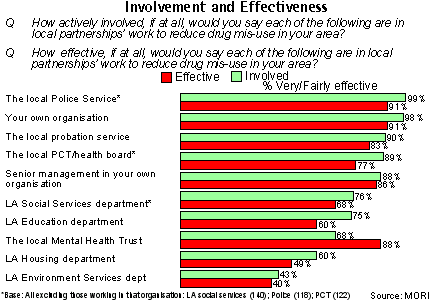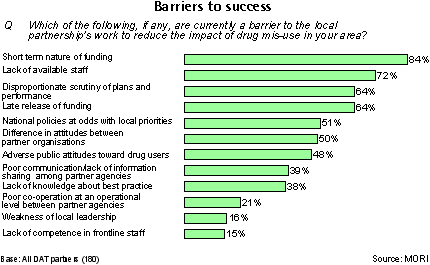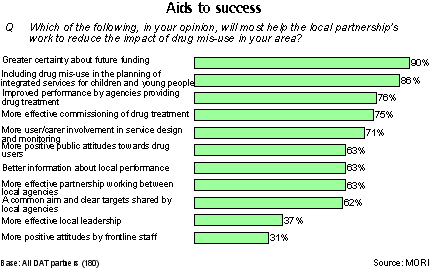Local Partnerships Tackling Drug Mis-use
MORI's research for the Audit Commission reviews perceptions of stakeholders regarding the importance of tackling drug use via local partnerships, and the factors which affect the success of such partnerships. The project was conducted with 180 Director-level Drug Action Team (DAT)/Partnership representatives (or equivalent) from a range of Local Authorities, Police Basic Command Units, Primary Care Trusts and Local Health Boards throughout England and Wales.
Director level stakeholders involved with the Partnerships are largely satisfied (90%) with the performance of their partnership; four in five (80%) feel local partnership provides value for money and a similar proportion (84%) would speak highly of it. One in 20 (five per cent) are critical of their current partnership.
The research investigates which elements of local partnerships are seen to be most actively involved and effective in reducing the impact of drug mis-use in a local area. The local police, probation and local PCT are seen as most involved and the local police and local mental health trust as most effective.

When asked what would most help their local partnership's work, nine in 10 (90%) say greater certainty about future funding would make the biggest difference. Just over a third (35%) say their partnership has totally or mainly assured funding for the next three years, while three in five (58%) have only partly-assured or no funding assured.
The majority think funding is likely to maintain current levels over the next three years. Positively, one in five think funding from Police and Local Authorities will increase (20% and 18% respectively) and nearly three in 10 believe they are likely to get more funding from Primary Care Trust or Local Health Boards.
Other barriers mentioned included the lack of staff available (72%), an excessive amount of scrutiny given to plans (64%) and the late release of funding (64%).

It is felt that the policies that will most help the work of partnerships include integrating drug mis-use services with other services for children and young people (86%), improving the performance of drug treatment agencies (76%) and developing a more effective treatment commissioning processes (75%).

There are mixed views about whether or not the national and regional monitoring arrangements for are having a positive impact on the ground (39% positive v 29% negative) and while half (50%) think that the National Treatment Agency has had a positive impact, nearly one in five disagrees (18%).
Read the full report at the Audit Commission website
Technical details
MORI Social Research Institute interviewed 180 Directors of Local Authorities, Basic Command Units and Primary Care Trusts / Local Health Boards represented on Drug Action Teams/Partnerships. All interviews were conducted by telephone. Fieldwork took place between 18th May and 14th June 2004. Data are unweighted. Quotas were set on client type (LA/Health/BCU) and area (England/Wales). Quotas were also placed on DATs to ensure a wide range of DATs/Partnerships were represented.



